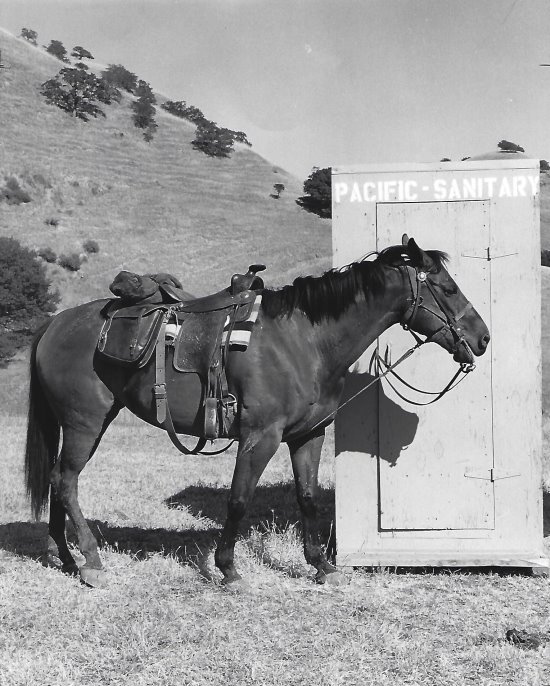
| ||||||
Back in May 1977, one resident wrote to the town council asking them to look into the problem. "Can something be done about the horse `droppings' that are becoming more prevalent on our streets and what few sidewalks we have?" she asked. "It is not only offensive, inconsiderate and unhealthy (flies), but unappealing, unattractive and unappetizing as well." One can't help but wonder why she chose to include the word "unappetizing."
According to a June 1977 newspaper article, a resident of Campolindo Drive had asked the town's leaders whether they were going to pass an ordinance to control horse droppings. Then Town Manager Gary Chase explained that it wasn't the kind of regulation that the staff wanted to enforce administratively, but should be done on a "neighbor to neighbor" basis. The policy of the day was to respond to a call with two members of the Public Works Department's maintenance crew and a town truck.
The horse traffic slowly began to subside as the car traffic increased in conjunction with Moraga's burgeoning population. Horse owners felt that the town's busy streets were no longer a safe place for their equine friends. Thus, the horse sightings and the "fallout" over their sharing the road began to dwindle. But, that did not stop the great horse poop debate from making its way into the neighborhoods.
Horse manure, and its subsequent attraction of flies, turned one bucolic parcel of land along Camino Pablo across from Joaquin Moraga Intermediate School, into a letter writing battle zone.
On Aug. 27, 1984, the pastor of St. Monica Catholic Church sent a letter to Moraga's Town Planner Dave Baker expressing concern that the parcel of land directly to the east of the church was being sold and advertised as "suitable for horses." Up until that point it was thought that the land had been used for sheep grazing. The letter stated, "It was our understanding that this was permitted since it was an existing use at the time of adoption of the town zoning ordinance."
Associate Town Planner Richard Chamberlain, in a Sept. 26 letter, replied, "The existing non-conforming status for livestock has terminated. Any request for horses or livestock would require a Use Permit with a Public Hearing by the Planning Commission. The meaning of the sales solicitation 'suitable for horses' is not very clear. I have already received several calls from perspective buyers who have questioned this."
Before December the property was purchased by a couple who was interested in keeping three horses on the 1.84 acres of land. They were advised by the town to "discuss your application with your neighbors prior to filing." Copies of letters to neighbors can be found in the Moraga Historical Society's archives.
The new property owners sent an application form on Jan 21, 1985, to the Planning Commission along with a letter detailing their plans for keeping the horses and allaying any apprehensions their neighbors might have. "Manure can, if improperly cared for, create two problems: odor and flies. Manure which is spread in the fields will break down and replenish the soil causing neither odor nor flies. Manure in an enclosed area such as a stable or pen will and should be transferred daily to a compost bin which will eliminate flies (due to the high temperature of decomposition) and odor (when layered with garden clippings, old hay, and other organic material). As for noise and dust, which are listed in your request sheet, neither are problems associated with the maintenance of horses."
A week later, St. Monica's Church once again contacted the town noting that all 26 members of the parish council "voted unanimously to express its opposition to this proposal" and noting that representatives would be present at any public hearings to explain their position on the matter.
Another neighbor, located on the other side of the property, responded to the idea of more horses once again taking up residence at that Camino Pablo address. Besides sending a letter noting her displeasure to the new owners, she also contacted Moraga's Planning Commission. "I would like you to know that I am very much opposed to horses again being permitted on that property. The [previous owner's] horses were the one completely annoying element of my life here." She continued, "One of the reasons many of us supported incorporation for Moraga was that we would then have somewhat more to say about the introduction of horses, for instance, into a rather closely occupied neighborhood. Regardless of care and planning, horses are not in my estimation desirable as relatively close neighbors, particularly during the long hot summers that we have in Moraga."
In what appears to have been an effort by the town to put the matter to rest, Contra Costa County's Health Services Department sent an inspector to assess the fly situation with regards to the horse manure issue. In a letter to the town, Senior Environmental Health Inspector Robert L Leighton, R.S. stated, "There was a thin layer of dried manure, in the main corral, with no accumulation visible. No odor was detectable at that time, fecal or otherwise. There is no evidence of fly breeding in or around manure. The only flies present were on the face of the pony." The report added, "It should be noted that the attraction of flies to manure is transitory, occurring when manure is fresh or piled and allowed to remain moist. Once dried there is no attraction to insects and, in fact, there is some evidence of repellence under this circumstance."
With the inspector's report, the issue appeared to have pooped-out, and no one came forward to make another stink about it.
Special thanks to Moraga Historical Society President Susan Sperry and Archivist Bonnie Krames.
Reach the reporter at:
